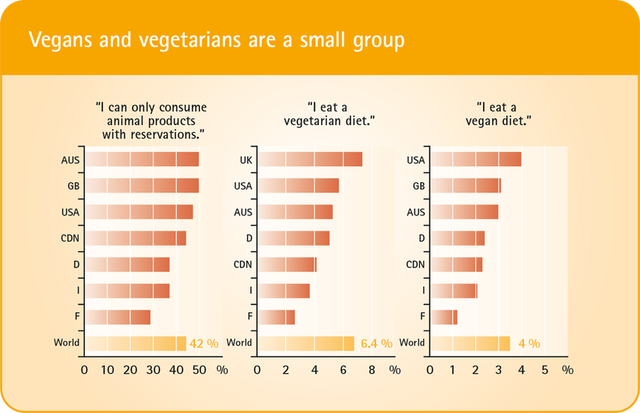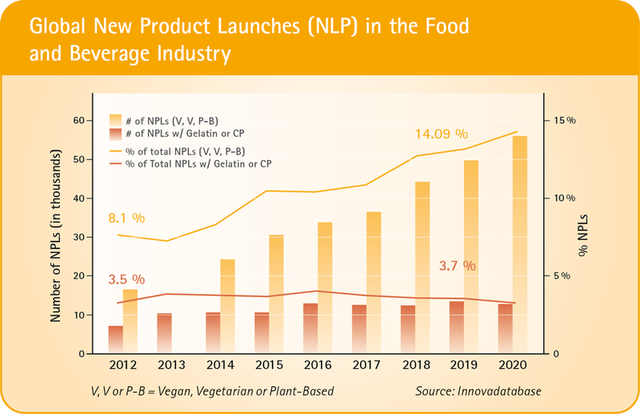
Market trends
The “free-from” dilemma
A challenge for food manufacturers
If you follow European media, you may get the impression that hardly anyone wants to consume animal products anymore. Almost everywhere is talking about how strongly the popularity of plant-based, vegetarian or vegan alternatives is currently growing. At the same time, consumers are saying, among other things, that they want products with natural ingredients and as few ingredients as possible, that animal welfare is important to them and that they are prepared to accept higher prices for this. But is that really the case?
There is no doubt that more and more consumers say in surveys that they are concerned about their health, their lifestyle, the environment and their diet. The coronavirus pandemic has exacerbated this trend. For example, a 2020 consumer survey by Innova Market Insights found that health, variety, sustainability and taste were the top four reasons to consider plant-based alternatives. Top of the list was health, cited by 53 percent of respondents worldwide.
Surveys often showan idealized image
It can also be observed that plant-based foods are on the rise. As a result, “plantforward” ranks second in the global top ten food trends in 2021. Taking a closer look at this trend, the Innova consumer survey shows: 36 percent of consumers would prefer a mixture of plant-based and animal products. Significantly more than those who would choose 100 percent plantbased products – a quarter of respondents said this. When it comes to protein in particular, hybrid products that combine animal and plant-based protein sources are in high demand. What many survey results have in common, however, is that actual consumer behavior is more indifferent. The differences between the information given in surveys and actual behavior are large. Meat substitutes, for example, usually have a very long list of ingredients, which consumers actually reject.
Animal products
But how does this trend affect the demand for animal products? It would be expected, for example, that the number of foods and beverages containing gelatin would decrease. The evaluations (Innova database) paint a different picture. For example, foods containing gelatin have a constant share of around 3.5 to 3.7 percent of new product launches.
While the rate of new vegan, vegetarian and plant-based product launches has risen in recent years to 14 percent in 2019. However, this also has to do with the fact that producers are increasingly relying on differentiating marketing positioning. We saw something similar in the early years of the “low-calorie” craze.

It is revealing how many people actually follow a strict vegan or vegetarian diet. A 2020 survey by Euromonitor Health and Nutrition shows: only 6.4 percent of consumers worldwide say they eat exclusively vegetarian. Only 4 percent have opted for a vegan diet. A much larger group excludes certain animal products but does not follow a strict vegan or vegetarian diet. These so-called flexitarians accounted for 42 percent of consumers worldwide in 2020.
The future remains diverse
In recent years, the desire for transparency and sustainability has also increased. More and more people want to know what exactly is in their food and how sustainably it is produced. Gelatin, for example, is a healthy natural protein and is classified as a food. As a result, it meets the requirements of clean label products. This means that even allergy sufferers can consume gelatin and collagen peptides from GELITA without hesitation. What should especially appeal to those who value sustainability: The raw materials used in the production of GELITA are completely recycled. The company is taking the zero-waste concept into account with this. Gelatin, like countless other products made from the by-products of meat production, plays a significant role in making it more sustainable. Moving away from animal ingredients does not solve the problem of meat consumption and certainly does not make it more sustainable.

NLPs with vegan, vegetarian or plant-based claims are on the rise. Nevertheless, new product launches with gelatin or collagen remain at a constantly high level.
THE consumer does not exist
Perhaps we all need to face the fact that there is no “one consumer” who tells us what products should look like, but that we have always been dealing with a wide variety of personal preferences. This is likely to remain the case. Especially when you consider the additional aspect that preferences can change more frequently throughout life. The result is a wide variety of products with which the food industry tries to satisfy all aspects.
We will cover this topic in more detail in the next issue of uptodate.

MORE INFORMATION:
Lara Niemann
GELITA USA
Phone ++1 712 943 1692
lara.niemann@gelita.com




